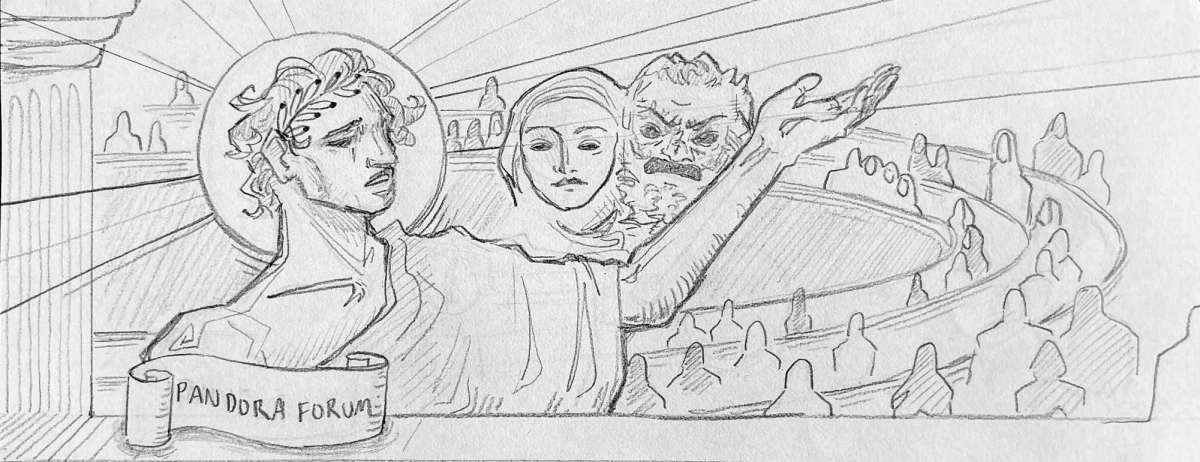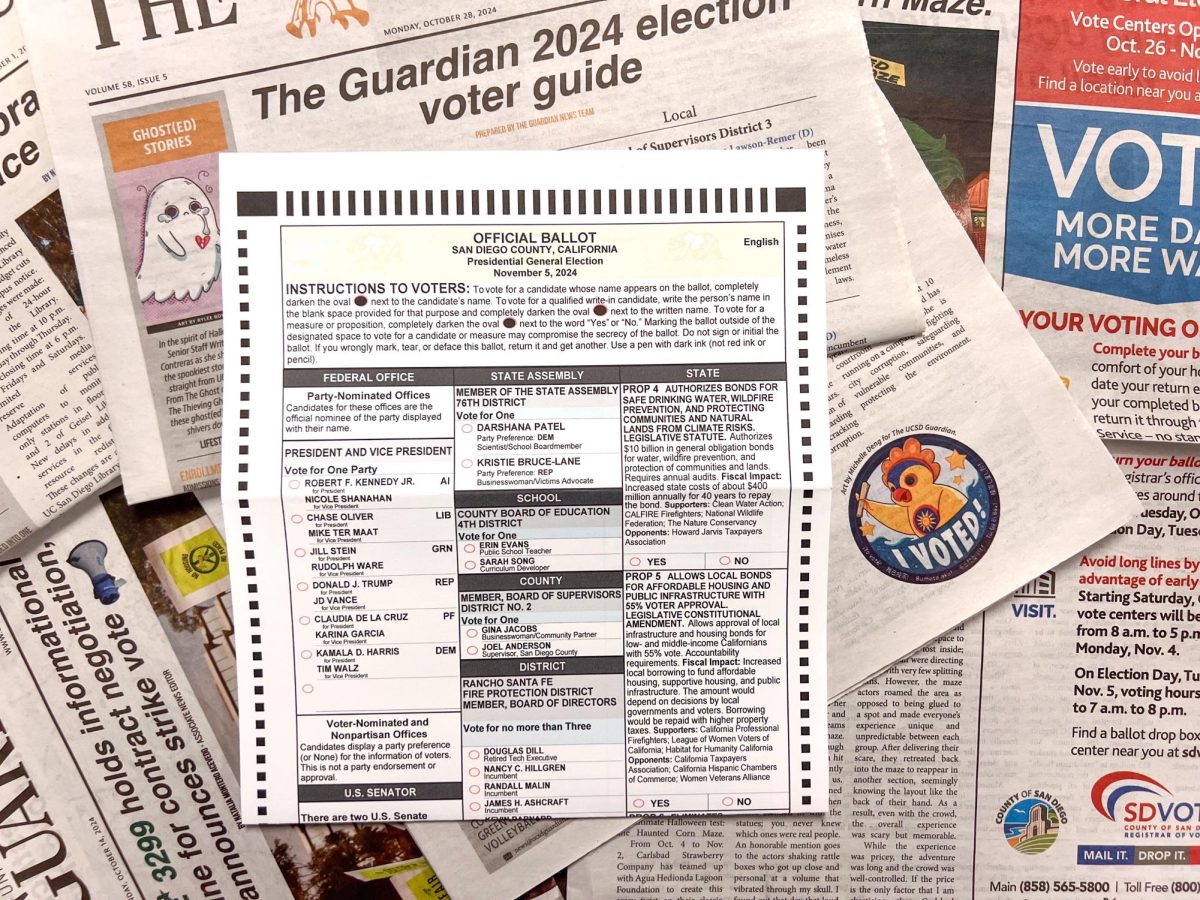On the night of Tuesday, Nov. 6, Donald Trump secured a victory in the 2024 presidential election. As more results are called, student voters at UC San Diego are having mixed reactions in real time. The UCSD Guardian interviewed one registered Republican and one registered Democrat about their feelings post-election. Their names have been changed to maintain anonymity.
Third-year student John* cast his vote for Trump, stating two key voting issues: the economy and immigration.
“Under Biden-Harris, it’s been an absolute disaster, and I hope that with Donald Trump being elected, we can actually fix those issues — make America affordable again, secure our border, stop all the fentanyl coming in, all the illegal drugs, tamp down on all of that,” he said. “I’d really say those are the two main issues: the economy and the border. It’s just gotten so expensive around here. I really think Trump won because of economics.”
John attributes the Harris loss to low turnout among Democratic voters, citing that the unpopularity of Harris from her 2020 primary run led Democrats in swing states to “sit this one out.” Another key reason John believes Trump was able to achieve such a sweep this election cycle is the swing of non-white voters’ preference away from Harris.
“I did not think it would be this extraordinary. We not only won in a big landslide, but we flipped Miami-Dade County, Texas and Florida are ruby-red now, over 10 points,” John said. “He’s basically swung the entire country red.”
On election night, John attended the San Diego County Republicans’ watch party. “We were very excited. I noticed a little anxiety in the air at first, but once we started to see the vote tallies come in … the general feeling I got was, ‘Just call it already!’” John said.
The call in favor of Trump has had immediate positive impacts on John’s life. He believes firmly that Trump will lower inflation and fulfill his campaign promises.
“I can say with certainty that my stock portfolio has shot up a lot since — in two days,” John said. “It’s a wild, wild ride. The one thing I want Trump to do is bring down prices. I want Americans to be able to own homes, live in beautiful families — [and] I want that for myself.”
With the Republicans also securing the Senate, John hopes for a unified Congress. However, with the outcome of the House election still unclear at the time of this interview, John expressed fears the potential for political tensions to “massively” increase.
“I know today, Letitia James [New York Attorney General] literally said that we have prepared contingencies to fight. I don’t know why we’re always obsessing about fighting. Can we just stop this? Can’t we just work towards common prosperity? I don’t understand it.”
John, who lives on campus, described his own contingency plan for Nov. 6 in the case of escalated campus tension. “I would say, on Election Day, that was definitely a potent fear,” John said.
In response to The Guardian asking for elaboration on that fear, John responded, “This was my thinking on election night before the vote was called: if Trump wins, there’s a not-zero chance that I may have to just book a hotel room for a night or two, or however long it takes for things to just sort of settle down. Because I was just a little scared that things would get … there would be violence or general issues, and I didn’t want to be caught in that crossfire.”
Regardless of the result in Congress, John is pessimistic about bipartisan relations in the wake of Trump’s win.
“I personally think [partisan tension] will get worse. That doesn’t mean I want it to. I would really like it if everyone would be able to tone it down because the whole partisanship is really just, it’s affecting us all. We all want the same thing, I’d say,” John said.
James*, a second-year student, voted for Harris. Though she wasn’t “the most ideal candidate,” this student stated that Trump’s administration would be far more detrimental for Americans.
He cited a number of issues that motivated his vote for Harris, including Trump’s plans for mass deportation and his tax policy. James also worries about Trump using this second term to completely reshape the branches of government through the “dangerous staffing of his administration,” much like his first term.
“Scared is the right word. This directly affects people I know and care about. I fear for the women in my life who have to worry about their bodily autonomy and basic human rights.”
James has identified many vulnerable populations in the wake of a Trump win. He expressed additional concerns about the impact Trump’s administration will have on young college graduates entering the workforce.
As he witnessed the election unfold, James described an initial feeling of shock. “We knew it would be close, but we didn’t expect it to be this bad,” he said.
James believes that the Democratic Party failed to appeal to essential groups of voters, including minorities and working class Americans. While Americans reflected on the failings of the Biden administration over the last four years, Trump appealed to their hope for more immediate, positive changes to their everyday lives.
“[Harris] wasn’t able to move herself away from the incumbency and affiliation with Joe Biden,” he explained. As a result, James speculates, Americans did not view a Harris presidency as a logical solution to their everyday problems.
“You have to remember that voters are selfish. At the end of the day, you vote for what will help you,” he said. “Our job isn’t to win the vote of the DNC; it’s to win the vote of the father and son who work in the steel industry in Wisconsin wondering how they’re gonna eat.”
Many news outlets have highlighted Trump’s message of urgency on economic issues as part of what pulled so many Americans toward him. James believes that this strategy was key to his success.
“[Voters] aren’t worried about the future; they’re worried about the now. We have to remember that context,” he explained. “If we don’t look at the working class, the voting blocks we’ve taken for granted, we continue to alienate ourselves, and Democrats won’t win,” he said.
Because Harris’ appointment as the Democratic nominee was made so late in the game, James theorized, Americans weren’t given the chance to choose the candidate they actually wanted. He thinks that with a proper primary election, Democrats would be more motivated to vote for their candidate.
“This is the biggest red wave we’ve seen in a while. It’s a response to an administration that took a lot for granted [and] acted very irresponsibly as a party and an administration,” he said.
James remains hopeful for the future of the Democratic Party and their ability to move past this loss.
“We should see a major change in the Democratic Party – they need to reshape, reexamine what went wrong, how it went wrong, how they are going to fix it, and not take minority votes for granted,” he said. “What we do now until 2028 will determine how we move forward. The fight isn’t over; it’s just the beginning.”










